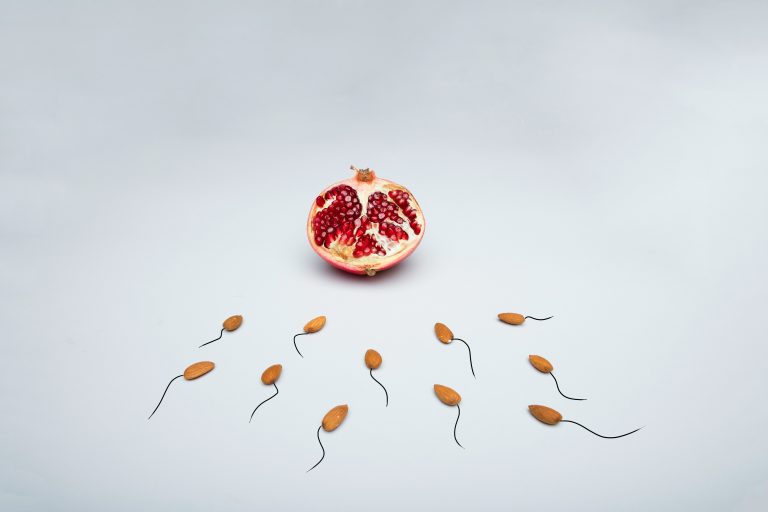

So you’re ready to start trying for a baby? Firstly, congratulations! It can be super exciting planning a pregnancy, but before you jump straight into it, there are a few things that you might want to consider to optimise your chances of conception, and to get yourself as healthy as you can before pregnancy.
You might think that it takes nine months to make a baby – but actually it’s more like 12. It takes around three months for an egg to mature before it’s released, and 75 days for sperm production, so your diet and lifestyle in the months leading up to conception are really important. Focusing on building a healthy diet and lifestyle can not only improve egg and sperm quality, correct any nutritional deficiencies and support regular ovulation, but will also get you in the best possible shape to carry a baby (and care for it after it’s born!).
For many women, this is an empowering time where you can create healthy habits that will see you well into the future.
So here are my top tips for those who want to optimise their fertility ahead of conception:
01. Check your weight
Weight is a bit like Goldilocks when it comes to fertility – both excess weight and low weight can affect fertility, so we want it to be just right. This means ideally you want your BMI to be between 19 and 24.9 before trying to conceive. Find out yours on the NHS BMI calculator here.
A raised BMI (25+) can reduce a women’s chances of conception. This may be because excess weight can disrupt hormone balance, and contributes to chronic inflammation and oxidative stress (which we want to limit when trying to conceive). All this can manifest itself in irregular cycles, lack of ovulation, issues with egg and sperm quality, problems with implantation, as well as an increased risk of miscarriage.[1] And men – this means you too! Male obesity can impact sperm quality and lower testosterone levels.[2]
If you are overweight or obese, focus on increasing your fibre by upping your intake of plant foods, reducing saturated fats and refined carbohydrates like white bread, pasta and rice, as well as reducing free sugars from foods like cakes, biscuits, chocolate and sweets.
A low BMI (less than 18.5) also affects hormone balance and fertility rates.[3] Oestrogen levels may be lower in women with less body fat, as some oestrogen is produced in the adipose tissue (aka body fat) – which means that our cycle might be disrupted. A low BMI may also result in irregular or absent periods, as the body shuts off reproduction to focus on other bodily processes. Ideally, women should have a BMI of above 19 to support ovulation.
If you do have a low BMI, try upping your intake of healthy fats (like nuts, seeds, avocado, olive oil), and make sure you’re getting enough protein for muscle growth. Consider building in a couple of balanced snacks to your day – with sufficient protein and healthy fats (examples I love are oatcakes and nut butter, smoothies, a handful of nuts, or some hummus and veg).
For more support with how to safely gain or lose weight, please do get in touch.
02. Diet (of course!)
Unsurprisingly, diet plays a powerful role in fertility, supporting regular ovulation, egg and sperm quality, nutritional deficiencies and medical conditions like PCOS and endometriosis. There is so much to say here, but in general, focus on a diet rich in a variety of colourful fruit and veg, with sufficient protein (aim for around 0.8g protein per kg of body weight, per day – so if you weigh 70kg, that’s 56g of protein per day), healthy fats and complex carbohydrates, while limiting processed foods and refined sugars, as far as possible. As a rough rule of thumb, I encourage clients to aim for the following at each meal:
- Non-starchy veg: 2 or 3 fist-sized portions per meal. As plentiful, colourful and diverse as possible! Low GL fruit (3x portions per day max)
- Grains / starchy veg: 1 fist-sized portion per meal. E.g. root veg (squash, sweet potatoes, parsnips), whole grains (oats, brown rice, quinoa)
- Protein: 1 palm-sized portion of lean protein per meal. E.g. eggs, chicken, fish, pulses, legumes, tofu, tempeh.
- Healthy fats: 2 thumb-sized portions per meal. E.g. avocados, oily fish, chia seeds, flaxseeds, olives, olive oil, nuts, seeds.
‘And what about alcohol?’ I hear you ask. Well, the current guideline is to avoid alcohol when trying to conceive. Heavy drinking (more than 14 units a week) may affect ovulation, and is linked to an earlier menopause.[4] It can also impact fertility treatments, and increases miscarriage risk. My view? Yes, in an ideal world we would avoid all alcohol when trying for a baby. BUT, sometimes life happens, and you’ve got to weigh up the risks vs the benefits. So if you want to have a small glass of wine at dinner with friends, or a glass of champagne at a party, then make sure you enjoy it.
And should you give up caffeine? The not so great news for the coffee-lovers out there is that for women, caffeine is associated with increased risk of miscarriage and stillbirth.[5] The current recommendation is to keep caffeine intake below 200mg per day, which is around 2 instant coffees, 1.5x filter coffees, or 2.5x cups of tea. Caffeine in high street coffee chains can vary dramatically, so it’s worth checking on their website for amount of caffeine in your favourite cuppa. However, if you have a history of miscarriage or are at high risk, you might want to consider cutting caffeine out altogether.
When it comes to supplements, I could write a whole blog on this topic alone! There are a few supplements that may be useful to optimise fertility (more on this to come!). But to keep it simple here, at the very least, a folic acid or folate (the non-synthetic form of folic acid) supplement is recommended for women for the three months before conception and in the first 12 weeks of pregnancy, as well as a vitamin D3 supplement. Research also suggests that a good quality pre-natal or fertility supplement may help to improve pregnancy rates and reduce the risk of congenital abnormalities.[6]
And men – it takes an egg AND a sperm to make a baby, so looking at diet is really important for you too. Especially cutting down on alcohol, maintaining a healthy weight and following the tips above.[3]
03. Stress
While trying for a baby can be exciting, it can also be incredibly stressful – especially if you’ve been trying for a while. And unhelpfully, we know that stress levels can negatively impact our fertility.[7]
Stress, whether emotional or physical (lack of sleep, overexercise, recurrent infections or toxic exposure), triggers the release of cortisol and adrenaline from the adrenal glands. Being in a long-term, unresolved state of ‘fight or flight’, can affect fertility rates, as our body chooses survival over reproduction.
Building resilience to stress in whatever form works for you is helpful – whether it’s meditation, journalling, yoga, breathwork, exercise, spending time outside in nature, making some time for yourself, or hanging out with friends.
To read more about how stress can impact our hormones, check out my blog here.
04. Sleep
Insufficient sleep is linked to decreased fertility in men and women [8], so prioritising sleep is also a must in the weeks leading up to conception and pregnancy. Focus on promoting good sleep hygiene habits and aim for 7-9 hours of sleep a night.
Here are some tips for a good night’s sleep:
- Wind down before bed. Get into a good night time routine – have a bath, read a book, make your bedroom nice and peaceful.
- Avoid vigorous exercise in the evening, as this might make it more difficult to sleep.
- Make your bedroom a phone-free zone. In fact, avoid those screens at least a couple of hours before bedtime. Leaving your phones out of the bedroom can also help with intimacy with your partner.
- Avoid caffeine after midday (or completely!). It sounds obvious that caffeine can impact our sleep, but it’s amazing how many people are still drinking caffeinated drinks late into the night. Caffeine has a half life of about 5 hours, meaning that after 5 hours, half the caffeine will still be present in our system, though this can be longer for some people. Try to avoid caffeine after midday, or if you’re sensitive to caffeine, cut it out altogether.
05. Movement
Moderate exercise may help to improve fertility for both men and women[9,10]. This can also help in maintaining a healthy BMI, which, as explained above, is important when trying to conceive. However, be mindful of overexercising, as this can place additional stress on the body.
If you’re a healthy BMI, getting for at least 150 minutes of moderate aerobic activity or 75 minutes of vigorous aerobic activity each week (or a mix), plus two sessions of strength or resistance training is ideal.[11]
A final word from me…
Of course, this is a HUGE topic, which I’ve only scratched the surface of here. Remember that all sorts of things can affect fertility, including nutrient levels, weight, conditions like PCOS or endometriosis, lack of ovulation, poor egg or sperm quality, and more, so if you are thinking of trying to conceive and want to find out more about how diet and lifestyle can support your fertility, please do get in touch. You can book in for a free 30-minute consultation to see how I can help you optimise your fertility here.
Please note, this blog should not be taken as medical advice. If you have any health concerns, please consult a medical professional.
References
- Metwally M, Ong KJ, Ledger WL, Li TC. Does high body mass index increase the risk of miscarriage after spontaneous and assisted conception? A meta-analysis of the evidence. Fertility and sterility. 2008 Sep 1;90(3):714-26.
- Salas‐Huetos A, Maghsoumi‐Norouzabad L, James ER, Carrell DT, Aston KI, Jenkins TG, Becerra‐Tomás N, Javid AZ, Abed R, Torres PJ, Luque EM. Male adiposity, sperm parameters and reproductive hormones: An updated systematic review and collaborative meta‐analysis. Obesity Reviews. 2021 Jan;22(1):e13082.
- NICE, “Fertility problems: assessments and treatment” (online), 2017. wwww.nice.org.uk/guidance/cg156
- Fan D, Liu L, Xia Q, Wang W, Wu S, Tian G, Liu Y, Ni J, Wu S, Guo X, Liu Z. Female alcohol consumption and fecundability: a systematic review and dose-response meta-analysis. Scientific reports. 2017 Oct 23;7(1):13815.
- Ayoub A, Yaseen M. Relationship between caffeine or coffee consumption and Miscarriage: Findings from systematic review and meta-analysis. Journal of Health Informatics in Developing Countries. 2022 May 17;16(1).
- Chavarro JE, Rich-Edwards JW, Rosner BA, Willett WC. Use of multivitamins, intake of B vitamins, and risk of ovulatory infertility. Fertility and sterility. 2008 Mar 1;89(3):668-76.
- Palomba S, Daolio J, Romeo S, Battaglia FA, Marci R, La Sala GB. Lifestyle and fertility: the influence of stress and quality of life on female fertility. Reproductive Biology and Endocrinology. 2018 Dec 2;16(1):113.
- Caetano G, Bozinovic I, Dupont C, Léger D, Lévy R, Sermondade N. Impact of sleep on female and male reproductive functions: a systematic review. Fertility and sterility. 2021 Mar 1;115(3):715-31.
- Hakimi O, Cameron LC. Effect of exercise on ovulation: a systematic review. Sports Medicine. 2017 Aug;47:1555-67.
- Minas A, Fernandes AC, Maciel Junior VL, Adami L, Intasqui P, Bertolla RP. Influence of physical activity on male fertility. Andrologia. 2022 Aug;54(7):e14433.
- NHS, “Physical activity guidelines for adults aged 19-64” (online), 2021. https://www.nhs.uk/live-well/exercise/physical-activity-guidelines-for-adults-aged-19-to-64/




